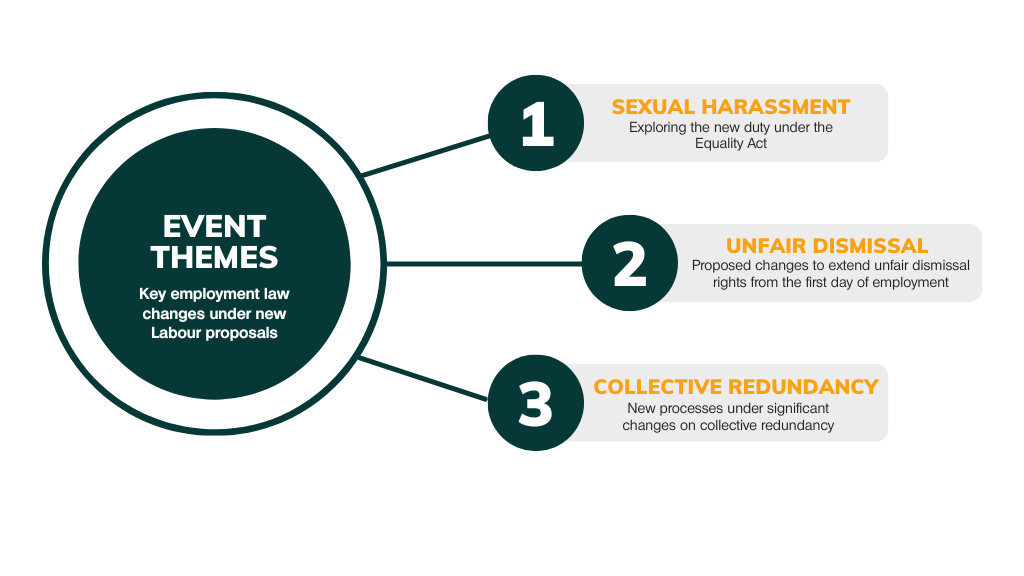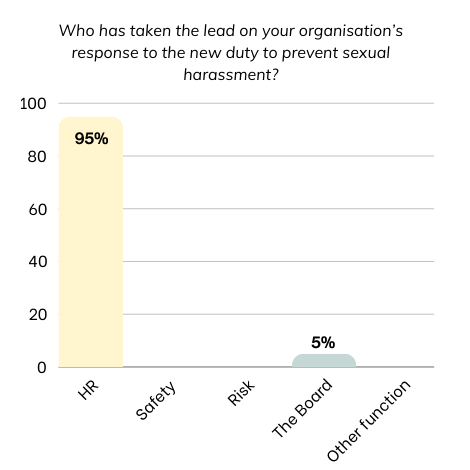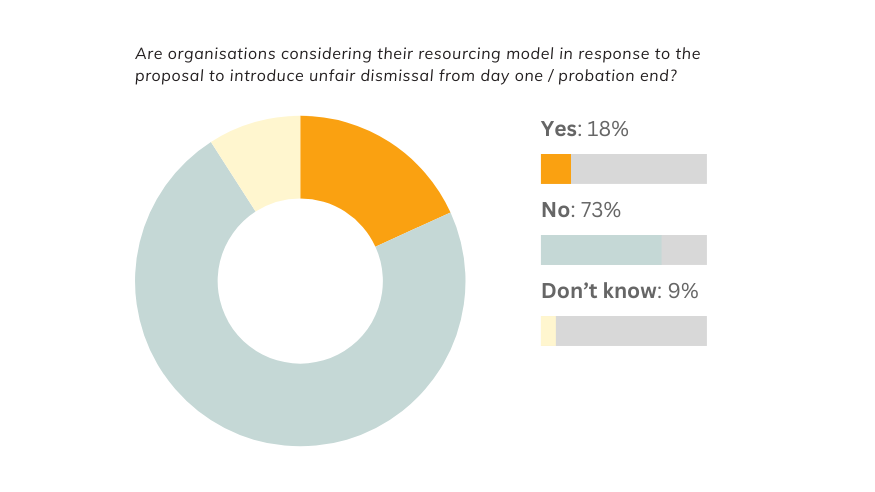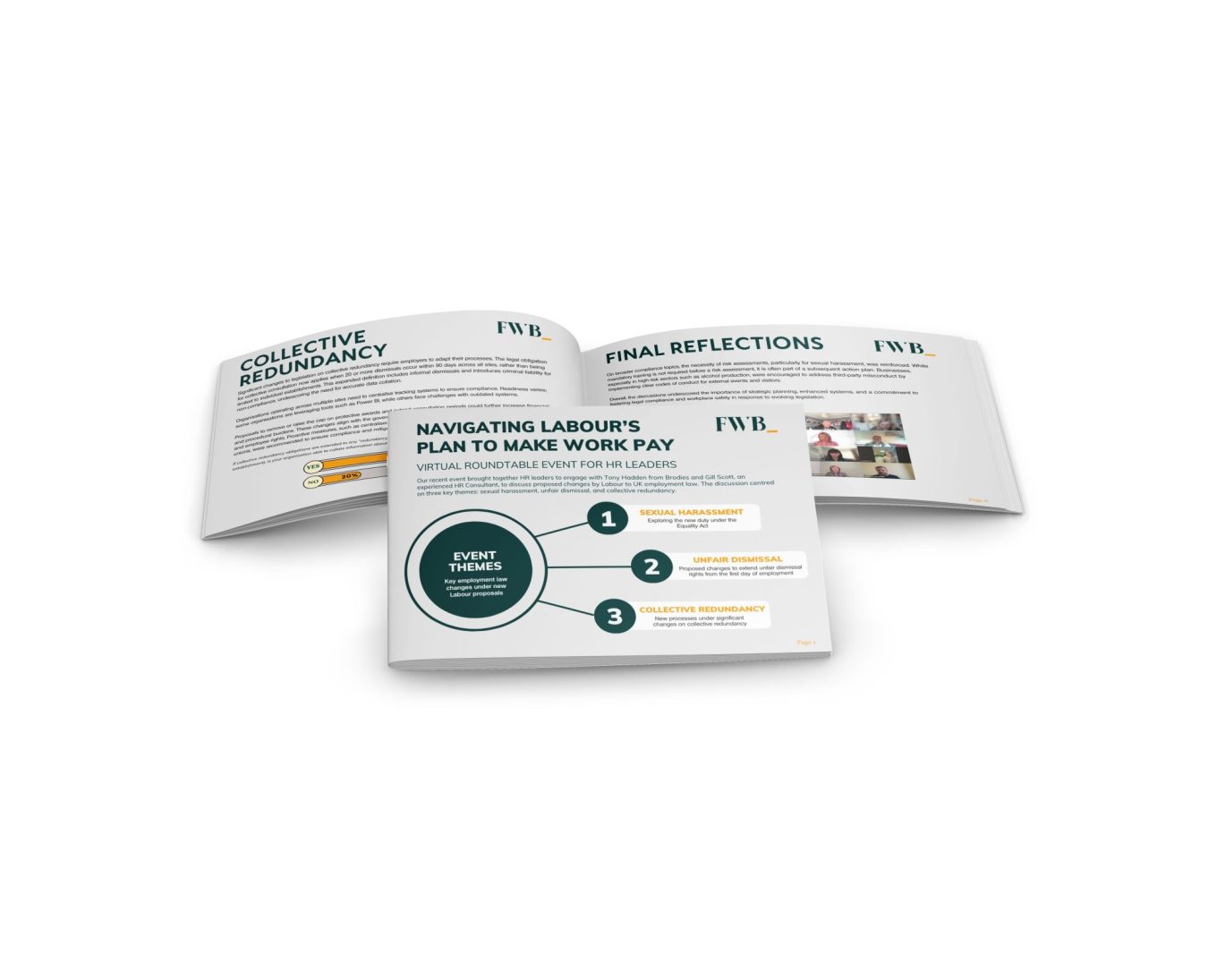Contact the team at FWB to discuss your individual or company requirements, or to discover more about our specialist services.
Key employment law changes under new proposals
28 November 2024
- Thought Leadership
- FWB Events

Insights from our latest virtual roundtable event for HR Leaders
Our recent event brought together HR leaders to engage with Tony Hadden from Brodies LLP and Gill Scott, an experienced HR Consultant, to discuss proposed changes to UK employment law. The discussion centred on three key themes: sexual harassment, unfair dismissal, and collective redundancy.

Sexual Harassment
The session on sexual harassment explored the new duty under the Equality Act, which requires organisations to take proactive steps to prevent workplace harassment. While enforcement by the Equality and Human Rights Commission (EHRC) is possible, we don’t anticipate widespread enforcement action so reputational risks and the potential for tribunal compensation to increase by up to 25% are the primary concerns for employers.
A poll conducted during the discussion revealed that HR departments often lead compliance efforts here and for some, would sit with their boards. Conducting effective risk assessments is critical, but many organisations struggle with defining the scope and execution of these assessments.
Participants emphasised the importance of leadership engagement, shared accountability across functions, and embedding prevention through training, codes of conduct, and policies. Organisations were encouraged to view these measures as essential not only for legal compliance but also for protecting their reputations.

Unfair Dismissal
The discussion on unfair dismissal focused on proposed changes to extend unfair dismissal rights from the first day of employment, excluding a probationary period, which remains the subject of consultation but may be somewhere between 3 and 12 months. Probation periods would likely involve a “lighter” dismissal test but would still not exempt redundancies from unfair dismissal protections.

These changes are expected to significantly affect restructuring and resourcing strategies. Many organisations are revisiting their probation frameworks, considering extensions to six months, and improving oversight and structure. Concerns were raised about shifts in resourcing, including increased reliance on agency or temporary workers to mitigate potential risks.
Leaders emphasised the need to balance compliance with organisational values, particularly in aligning notice periods and senior-level practices with fairness and cost-effectiveness. Data-driven insights into early exits were highlighted as a useful tool to help organisations adapt to these anticipated changes.
Collective Redundancy
Significant changes to legislation on collective redundancy require employers to adapt their processes. The legal obligation for collective consultation will apply when 20 or more dismissals occur within 90 days across all sites, rather than being limited to individual establishments.
Organisations operating across multiple sites need to centralise tracking systems to ensure compliance. Readiness varies; some organisations are leveraging tools such as Power BI, while others face challenges with outdated systems.
Proposals to remove or raise the cap on protective awards and extend consultation periods could further increase financial and procedural burdens. These changes align with the government’s broader agenda to enhance trade union involvement and employee rights. Proactive measures, such as centralised data systems, tailored training, and engagement with trade unions, were recommended to ensure compliance and mitigate risks.

On broader compliance topics, the necessity of risk assessments, particularly for sexual harassment, was reinforced. While mandatory training is not required before a risk assessment, it is often part of a subsequent action plan. Businesses, especially in high-risk sectors, were encouraged to address third-party misconduct by implementing clear codes of conduct, including setting behavioural standards for external events and visitors.
Overall, the discussions underscored the importance of strategic planning, enhanced systems, and a commitment to fostering legal compliance and workplace safety in response to evolving legislation.

Download our full event report here.
"*" indicates required fields






